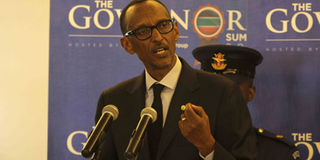MUTIGA: Asian Tigers chose their own paths, but we refuse to think for ourselves

PHOTO | SULEIMAN MBATIAH Rwandan President Paul Kagame fielding questions at The Governors' Summit 2014 at Great Rift Valley Lodge in Naivasha on January 20, 2014.
What you need to know:
- South Korea achieved its economic miracle under strongman General Park Chung-hee who came to power through a military coup and proceeded to rule by decree for two decades. He suspended the constitution, jailed opponents and ignored institutions outside the presidency.
- The president should be elected in line with the high threshold set out in the Constitution. But they should serve only one, seven-or-eight-year term.
- The Asians chose their own path and it worked. The great Indian economist Armatya Sen was asked last week why India, a democracy, still has such steep levels of poverty today while China has done so much better by all measures from education to healthcare to family income.
Kenyans have heard this example repeated to the point of exhaustion: That countries such as Kenya and Ghana were at the same level of development as Singapore and South Korea half a century ago, but today the Asian Tigers have leaped ahead while Africans remain mired in poverty.
Barack Obama picked up the refrain at the University of Nairobi in 2006: “One statistic powerfully describes this unfulfilled promise. In the early 1960s, as Kenya was gaining its independence, its gross national product was not very different from that of South Korea. Today, South Korea’s economy is 40 times larger than Kenya’s.”
It is true, of course. But there is one thing that goes unmentioned in all these narratives. It is that the great economic success stories of South Korea, Singapore and Malaysia were authored under conditions of near-absolute dictatorships.
South Korea achieved its economic miracle under strongman General Park Chung-hee who came to power through a military coup and proceeded to rule by decree for two decades. He suspended the constitution, jailed opponents and ignored institutions outside the presidency.
He had a single-minded ambition: To make South Korea the equal of Japan, which had risen to power through massive reforms aimed at achieving 100 per cent literacy and healthcare coverage accompanied by rapid industrialisation.
He succeeded. Today, democratic South Korea is an industrial powerhouse, the home of Samsung and Hyundai and the most wired country on earth with living standards to match.
Lee Kuan-Yew led his Singapore the way a headmaster runs a primary school, complete with public floggings. He made the civil service an extension of his party. There was little room for dissent.
And, in time, just as Mahathir Mohamad did in Malaysia, poverty levels were reduced by margins only witnessed in that other great, economically successful dictatorship, China.
So should Africa turn to enlightened dictators in the mould of Paul Kagame in pursuit of economic policies that will lift millions out of poverty?
My view is yes and no. Unlike in rapidly developing Asia. in Africa the number of ethnic groups to satisfy means that the dramatic moves needed to transform economies, such as Mahathir’s decision to mechanise rice-growing in Malaysia which cost thousands of jobs, would never enjoy broad support here and might multiply conflicts.
HYBRID SYSTEM
So, why not try a hybrid? The American-style politics Kenya is now witnessing of perennial competition among rival ethnic elites has never been known to yield progress anywhere. We should have a mixed democracy.
The president should be elected in line with the high threshold set out in the Constitution. But they should serve only one, seven-or-eight-year term.
That would give them the strong mandate necessary to implement the painful reforms required to alter the decaying government structures we have built for 50 years.
This would also free them from the eternal political bargaining that distracts from what should be the mission of government — improving people’s lives.
To tackle the fear of perennial ethnic domination, a clause should be built into the Constitution requiring ethnic rotation of the presidency. No leader can come from the same community for, say, a four-term electoral cycle. It is not democratic.
But who said the whole world should be governed by a perfect model of American-style Jeffersonian democracy?
A primary problem in Africa is that we refuse to think for ourselves and insist on adopting what has worked in the West, ignoring our own special circumstances.
The Asians chose their own path and it worked. The great Indian economist Armatya Sen was asked last week why India, a democracy, still has such steep levels of poverty today while China has done so much better by all measures from education to healthcare to family income.
He said that the difference is that in China, you only need to convince 20 enlightened people that a policy is right while in India you have to convince 200 million.
The Constitution we chose in 2010 is overall a good document. But we should adapt it to our needs. Only a leader without an eye on re-election would be able to make the painful decisions that transformed South Korea from a basket case to a powerhouse in 20 short years.
The writer, an editor with the Sunday Nation, is a Chevening Scholar at the London School of Economics [email protected]





